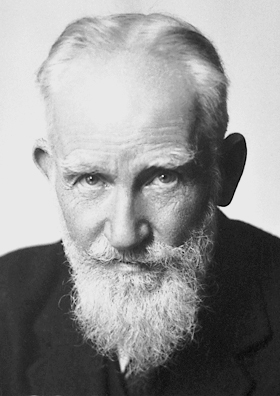 |
| By Nobel Foundation [Public domain], via Wikimedia Commons |
Winner of the the Nobel Prize for Literature in 1925 (for his play, Saint Joan) Shaw's work extended into other media and genres, including the silver screen. He provided the screenplay for the film version of Pygmalion, which garnered two Academy Awards, including one for Shaw himself. Music however was Shaw's first love and perhaps his most enduring. He began his literary career as a music critic and was well into his forties before he took up drama in a serious way, becoming, in some people's estimation, the second most important English-language playwright after William Shakespeare.
A man of prodigious talent and a work ethic that lasted up to his final days, Shaw combined it all with a spirited nature and irascible wit, which shines throughout his literary output and legacy, using comedy as a device to question conventional morality. He was also a keen political commentator and ardent campaigner in the cause of social reform. A professed and outspoken socialist, he was most closely associated, publicly and politically, with the Fabian Society - a group of intellectuals whose views can broadly be characterised as reformist and social democratic.
George Bernard Shaw was born in Dublin, in 1856, to a middle-class family of Protestant ascendancy stock. He moved to London in 1876 and returned to Ireland only occasionally thereafter - on one occasion meeting Michael Collins, just days before his assassination. Although he made his home in England, where he died in 1950, his relationship with his home country remained strong throughout his life. He even took out dual citizenship following Irish independence and his initial reluctance to accept the Nobel Prize (due to unease he felt about the origin of the award and its connection with the armaments industry) was overcome by the realisation that it was an honour that would be celebrated and appreciated back home. With this anniversary falling in the centenary year of the Easter Rising of 1916, it is notable that Shaw, though scarcely a nationalist or republican, was among the first public figures to speak out against the repression and executions that followed.
Shaw was a celebrated figure in his lifetime and his death was mourned around the world, causing "the Indian cabinet to adjourn, theatre audiences in Australia to rise for two minutes' silence, and the lights on Broadway and in Times Square to be dimmed."






No comments:
Post a Comment